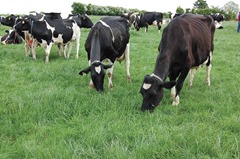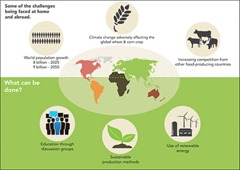Ireland’s agri-food sector: staying ahead of the competition
 The Irish food and drink sector is expanding exponentially but it faces serious challenges on the international and domestic fronts. Business process outsourcing company SouthWestern is playing a key role in safeguarding Ireland’s excellent reputation while also helping to drive the sector forward.
The Irish food and drink sector is expanding exponentially but it faces serious challenges on the international and domestic fronts. Business process outsourcing company SouthWestern is playing a key role in safeguarding Ireland’s excellent reputation while also helping to drive the sector forward.
How good is your knowledge of Irish agriculture? What would your best ‘guesstimate’ be of the number of calves born here last year? Registering, documenting and tracking every calf born in Ireland is one of the key tasks carried out by SouthWestern on behalf of the Department of Agriculture, Food and the Marine and last year the company registered over 2.1 million calves, using automated identification and data capture technology.
Recently, the team responsible for recording details of the national herd set a new record when registering 40,000 new calf births in a single day. Since 1996, SouthWestern has registered forty million calves, creating a unique passport for each and every one of them.
The decision to create a robust traceability system for the national herd was taken by the then Department of Agriculture, Food and Forestry in the mid-nineties following a number of international food scares and increasing demand for such systems. This forward thinking and highly innovative move anticipated the increasing emphasis in food production on safety, traceability and sustainability. The system, which is constantly being updated, is linked to marts, abbatoirs and the State’s animal testing regime and ensures animals are tracked from farm to fork.
Ireland’s reputation for producing high quality food products rests first and foremost on those products and the people who help produce them, our highly skilled farmers and food producers. Our temperate climate provides a natural grass-fed diet for animals and our farmers capitalise on this to supply producers with excellent meat and milk. It’s a winning combination.
Traceability is a key piece of the food safety jigsaw but there are other aspects which are increasingly important,
such as sustainability. For example, SouthWestern, with the help of tablet technology, carries out over 20,000 farm inspections every year to verify farmers are complying with Bord Bia standards. These inspections ensure Irish beef and lamb is produced to the highest standards, in line with our quality assurance programmes. They also measure the carbon footprint of our farmers to provide vital data in this area and to provide evidence of our low carbon emissions.
Recently a new Sustainable Dairy Assurance Scheme was launched and this programme ensures our dairy farms are independently audited by qualified and experienced auditors. Similarly to the beef and lamb quality assurance programmes, it ensures dairy products are being produced to the highest standards in a safe and sustainable manner.
With the world’s population expected to hit eight billion by 2025 and nine billion by 2050, it’s clear the demand for food products is only going one way. The trick for Irish companies will be to predict trends and give the various markets what they want in a timely and cost efficient manner.
It’s a fast-paced market and Irish food companies will have to adapt quickly if they are to avail of the opportunities to produce more value-added product. Ireland’s excellent track record in producing high quality food and its reputation for food safety is a huge help in this regard and it allows Ireland to differentiate its products and go after these higher value-added markets.
For example, the demand for high quality ‘ready-to-cook’ products for busy consumers has grown hugely in recent years. Many of our key trade partners are mature markets which place a high importance on sustainability and traceability. Fortunately, it’s also where customers are willing to pay a price premium.
Challenges
One of the main challenges in the future will be how we increase input while at the same time reducing our carbon footprint. According to a recent report by the UN Intergovernmental Panel on Climate Change, global warming already poses a threat to global food stocks.
David Lobell, a professor at Stanford University’s Centre for Food Security, said the impacts are already evident in many places in the world. “Almost everywhere you see the warming effects having a negative effect on wheat and there is a similar story for corn as well. These are not yet enormous effects but they show clearly that the trends are big enough to be important,” he said.
According to the Red Cross, the word ‘risk’ was mentioned 230 times in the report compared to just 40 mentions seven years ago. Carbon emissions are closely monitored under the Kyoto Protocol and it’s clear the focus on monitoring and lowering emissions will continue in the long term. Agriculture is a significant contributor to our emissions and as a result the onus will be on the sector to produce more from fewer resources e.g. less waste, less energy and increased use of renewables.
Competition from other countries is increasing all the time. Well-known beef producer Argentina, for example, is increasing the size of its national herd but not many people outside the sector would be aware that India is a significant producer of beef. How can Ireland stay ahead of the competition? One way is through genetics and continuously striving to improve our breeds by working with the Irish Cattle Breeding Federation. Another is through innovation, through research and development and by maximising our technological superiority.
However, we also need to look at the changes we need to make here in Ireland and see what we can do better. For example the age profile in some sectors is rising and some of these farmers may be less inclined to innovate. Others may be small, inefficient producers with no economies of scale, who are overly reliant on Single Farm Payments.
How can we tackle these problems at source? Whether through discussion groups, outreach farm education programmes or working with the farmer representation groups, we need to encourage low input, sustainable methods of production while also instilling a strong commercial perspective. We also need to encourage collaboration between the research sector and the industry to find new ways to reduce inputs and gain efficiencies at all levels of the supply chain.
These are exciting times for Irish farmers and food producers. Now is the time to build on our excellent reputation for quality, safety, traceability and sustainability. The decision to set up these systems has paid and will continue to pay rich dividends – both reputational and financial. SouthWestern is proud to play its part in maintaining Ireland’s excellent reputation for food production. By focusing on what we do best, we are enabling the public and private sector to concentrate on their core skills and on taking full advantage of the global and domestic opportunities which now exist.
John Carroll is the Head of Animal Traceability at SouthWestern.
Tel: 023 883 2843
Web: www.southwestern.ie
Email: john.carroll@southwestern.ie






